
| My, mother, Kate (Kit) Foster, was born in Orpington
in 1915 and lived there all her life. The picture above shows her
with her mother at a family wedding in 1951. She married Jim Churcher
in 1939 and moved from Elmcroft Road to a house in Court Road which overlooks
the Priory Gardens. Although they travelled quite widely in later years,
they both loved Orpington and were always pleased to come home. Mum
wrote this account of the Orpington of her childhood a few years before she
died in May 1988. The interesting pictures of old Orpington were kindly provided by Anthony J. Lathey of the Cray Comment, St. Mary's Church's Newspaper. |
Colin J. Churcher
|
When my mother and father were first married they had a house in Aynscombe Angle. Dad had moved here from Bromley when they moved the railway sheds to Orpington from Bickley. The first row of houses were being built in Elmcroft Road and my Mum used to say she would like one of them (to rent of course) and that's where I was born. My brother was born in Aynscombe Angle. The houses were known as Elmcroft Villas in those days - there were several elm trees in the fields around them. The houses were very popular with the railway men. We had nine families of railway folk there when I first remember it. They were a mixed bunch - drivers, signalmen and one ganger. The only time there were any arguments was between the NUR (National Union of Railwaymen) men and the "Associated" (ASLEF) as Dad would call them. Dad was a strong NUR man and always attended the Branch meetings on Friday nights at the room above the White Hart pub. When he said he was going to the Branch I couldn't understand what he meant - I had visions of him climbing the branch of a tree!. Should any emergency arise in the street such as a heavy snowfall, illness or death they would all pull together no matter what their politics (they were mostly labour supporters). 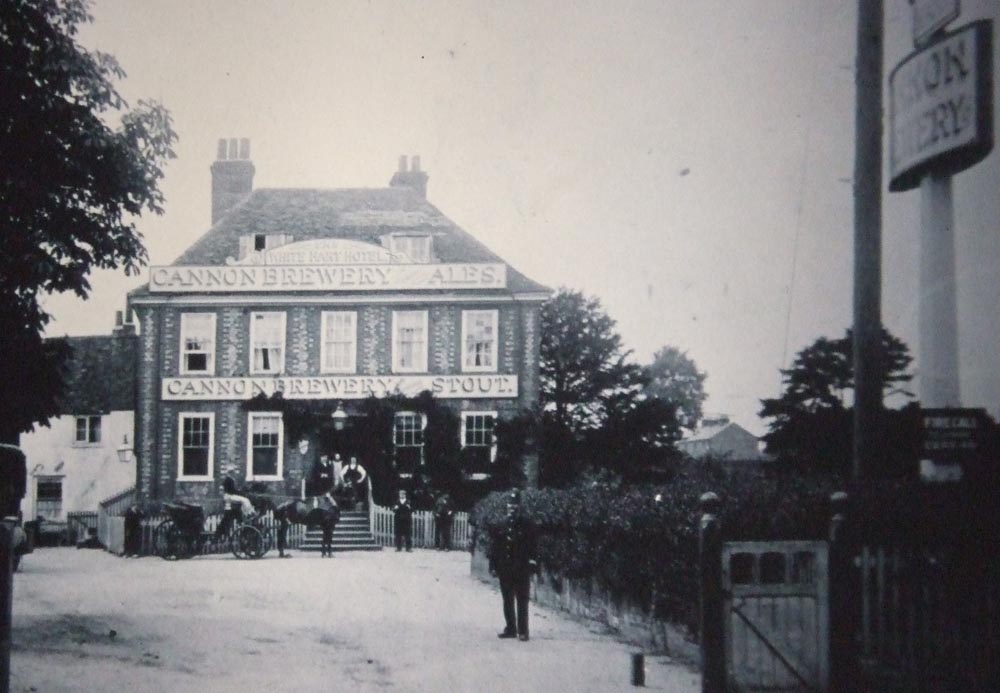 The Old White Hart pub. Our little house was always cosy. Dad always had a roaring fire as he felt the cold when he came off the engine. We always had plenty of coal as Mum would buy a hundredweight every week winter and summer and Dad could buy sleepers from the railway for 6d each. Mr Salmon the coal merchant woulld deliver them from the station and the men would help each other saw them up with the crosscut. Then Dad would chop them through for firewood. Any widows would also get some. We only used them to light the fire as they used to spit. Mum did all her cooking on a black range. It was scrupulously black-leaded every Friday morning before breakfast and the hearth was cleaned with a lump of hearthstone (costing ld). We had a steel fender round the hearth which had "Home Sweet Home" written in the middle of it. I have always marvelled at the way Mum could tell the exact heat of the oven for cakes. She would just put her hand in and could tell the exact heat she wanted - whether for cakes or pastry. There was always something cooking in the oven - baked apples, casseroles, pies, jacket potatoes or milk puddings. We got our hot water from the hob at the top (this was blackleaded as well). We had an enormous dark blue enamel kettle (which we called "Blue Lou") and that was always full of water but if we wanted just a little boiling water we had a small tin kettle which boiled in no time. Our front room was seldom used. It was kept for visitors but came into use for Christmas or birthday parties. It was a very small room but I preferred our cosy kitchen where I could make a mess and not be ticked off for it! Mr Smith kept a grocer's shop at the corner of the road. He was always known as "Snatchy Smith" because as soon as we put the money on the counter his bony white hands would snatch it! The biscuits were kept in big tins with glass lids so that you could see what kind they were and were sold loose, not in packets as today. Whenever you bought eggs from him he always "candled" them first to make sure they were not bad. He always had a small gas flame burning for this purpose. Sugar too, was sold loose and after weighing was put in a paper bag folded rather like a dunce's cap and then screwed at the top. The cheese was cut into just the right size you wanted with a very taut wire on a wooden board and there was a choice of mild, mature, Dutch or gorgonzala. I cannot remember any cream cheese. Bacon, too, was cut specially for you and you could decide whether you wanted it in thick or thin rashers. Butter, margarine and lard too were cut from big blocks and patted into oblong shape with wooden patters. When Mum went up there for groceries she would make a list and hand it to Mr Smith and then sit on a small flimsy wooden chair whilst he got it all ready for her. Mr Smith was a tall thin man with a completely bald head which shone as if it had been polished. His wife was a thin frail person who suffered from a very weak heart and was always coccooned in a black shawl. The Fire Station was opposite the shop and when there was a fire one of the men always nipped into the shop to warn Mrs Smith that the maroon was going to be fired so that she would not get too much of a shock. There was only one fireman who lived above the Fire Station and the maroon was sent up to call as many firemen as possible. They all had various occupations and would get to the station as quickly as possible - on push bikes or running like mad! When enough men had arrived they would set off for the fire but not before they had caught the horse in the field and put it into the engine. Most of Mum's shopping was bought from the Co-op. The nearest branch was in St Mary Cray. The groceries were delivered by horse and cart (or van) mostly late on Friday afternoons. Mum had a delivery book and would write the orders one week to be delivered and paid for the next. it was exciting on dividend day when we would walk to Cray to sign for and receive the dividend (it was about 1/3 in the pound and so mounted up). If I was very good I would get a bag of sweets or 6d so I was always good that day! As I first remember it, Orpington was a very sleepy village. The High Street was the main thoroughfare. All the shops were small and privately owned. We had two little chemists and two bakers. The ovens were at the back of the shop and the lovely smell from the breadmaking was wonderful and appetising. One baker was a hunchbacked man called Mr Stringer and his daughter sold the cakes and bread in the shop. A bought cake was a treat to us as Mum made all her own cakes - Dad wouldn't eat bought ones ("I like to know what's in them matey!"). There was also a dairy that sold milk, butter, cream and eggs. We had our milk delivered by a girl who took over the deliveries when the 1914 war started. She used a horse and float. The big churn was on the float and she would come to the door with a smaller can with pint and half pint measures hanging on the side. Mum would take a jug to the door and it would be measured out. She came round twice a day, morning and evening. We only took just enough to take us through the day as the milk would not keep long as it wasn't pasteurised and would soon go solid especially in the summer (there were no fridges in those days). We had a fishmonger who used to come round once a week and another one called an Sunday afternoons selling winkles, shrimps and occasionally prawns. We always had something like that for Sunday tea and I preferred the shrimps. We used to dig the winkles out with a needle and sprinkle them with vinegar - delicious with bread and butter. In the winter time the muffin man would come ringing his hand bell and carrying the big tray on his head. It was covered with a snowy white cloth and we could toast them in front of the fire. They were delicious soared in butter. Margarine was for cooking purposes only and tasted horrible. It was branded "Blue Brand". Our house had three bedrooms and I had the smaller one. Although there were fire grates in all of the bedrooms the fire was only lit if we were ill. We never had a fire or any kind of heating in the bedrooms even if it was bitterly cold. I think the idea was to get into bed as quickly as possible and cuddle up to a stone hot water bottle which we put into a knitted wool bag. Our house was all gas in those days (Dad wouldn't have electricity in the house - he thought it was dangerous!). There was a fish tail gas light in the hall and the other ones had mantels in them. We had a small back garden where Mum kept about eight chickens and a few rabbits - all for food of course. The front gardens too, were small but they looked a picture in the late spring as the landlord had planted red may and laburnum alternately. We had a laburnum tree between our house and the next and I distinctly remember being violently sick after eating some of the seeds. Perhaps it was a good thing I was sick as I have heard that they are very poisonous. There was a little drapers on the corner of Moorfield Road. They sold all kind of things - materials, tapes, cotton, ribbon etc. Often the goods were priced with an odd farthing at the end e.g. 2 3/4d or 4 3/4d and for change you had a choice of a paper of pins or a farthing. Further along Moorfield Road was a little shop called Madam Myra's. It was run by two sweet old ladies - one always wore a black ribbon round her throat - just like Queen Alexandra! 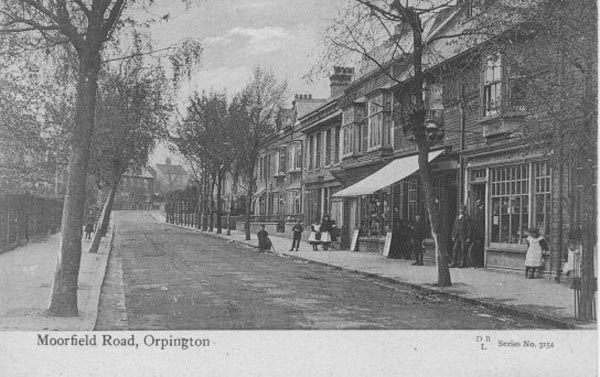
Along the High Street was the doctor's double fronted house. He was quite a tall big man with thick lips and was an old Indian Army doctor. He was very stern but could be very kind. He knew us all by our Christian names and had brought almost all of us into the world. I think he was a batchelor and was looked after by a housekeeper. He never gave us prescriptions but made up all his medicines in a little cubby hole next to his surgery. Of course in those days they were all liquids, not tablets. Some of his concoctions tasted revolting. We seldom had a doctor to call although Dad paid into a club for a free doctor when needed. Mum could usually deal with any childish complaints and we knew if the doctor was called it was serious!. One day I had a rash which even Mum could not identify so the doctor was called and announced that I had german measles. Mum hadn't met that one before. Towards the top of the High Street on the right hand side was a very big house called Mayfield House (hence Mayfield Road). It had a semi-circular drive and was flanked by smooth sweeping lawns with peacocks strutting about. Sometimes we would see the big iron gates opened and a carriage and pair of horses drive up. Knoll Rise and Station Hill were flinty lanes and I have often been blackberrying where the Electricity Board is now. Spur Road was just a big field with sheep grazing in it and I remember a shepherd letting me hold a lamb which was just an hour old. Sometimes in the summer Mum and a friend would take me for a walk to Green Street Green and back (there were no busses then) and we usually took a picnic tea with us. When we passed the water pumps near the railway bridge they seemed enormous to me. They used to go up and down and the noise would frighten me but I was afraid of saying anything for fear of being called a baby. I was always pleased when we had passed them. On the way back I usually had a pennyworth of sweets in the form of coloured letters. These kept me quiet and I loved to spell my name in them.  Hodsoll's Mill seen from the Priory pond - close to where the Palace Cinema was erected. At the other end of the High Street was the pond. it was very overgrown and had a ford at each end. In the hot Summers the horses were driven in at one end and Out the other. I remember one day a horse and cart got to the middle and wouldn’t move. The man shouted and swore at the horse and also gave it some stick - I suppose he was enjoying the coolness of the water. The water from the pond, which is fed from a spring, was piped under the road and came out at the other side by the old picture house (cinema) as a stream. This ran into quite a big mill pond (I remember rowing a boat on it) and then it ran through the fields and eventually became the River Cray. The Priory was privately owned in those days by a Mr and Mrs Hughes. Mrs Hughes bred red setters and had a kennel maid. The dogs were very vicious and we kids gave the pond a wide berth if we knew the dogs were loose. I have had several clouts for paddling in the muddy water. Luckily I never fell in! My favourite day of the week was Saturday. As soon as we had had breakfast, I started my weekly chores. Help wash up, brush and dust the stairs down (no vacuum cleaner) whiten the two steps at the front of the house and clean the brass on the front door. Then polish the hall and scrub the kitchen. It all had to be done properly or I didn't get my weekly sixpence. In the afternoon I went to the pictures at the local Picture Palace (known as the Bug Hutch!). The seats were priced at 2d, 3d, 4d and 6d. The 2d seats were just wooden benches (we called them "the splints") but the rest were padded with red velvet and had arm rests. I always went in the 3d which gave me a penny to spend and 2d to save! If it was a particularly good film like Charlie Chaplin there would be so many kids that we often had to sit two in a seat. The programme consisted of a news film then the big picture. Then we had an interval and the Manager would appear at the front and shine his big torch over the audience. If it stopped on you, you had a prize - a free ticket for the next week's show or a small slab of chocolate. We usually took sweets with us or bought them off the tray and I remember a friend of mine who was turfed out because she had a bag of Sharps Toffee and the Manager was afraid she would make the seat sticky. She had to stand at the top until it was gone! After the interval we had a cowboy serial and then a comedy to finish. Sometimes during the performance the doorman would come down the centre and spray us with a scented liquid, possibly a disinfectant. My mother would often go to the pictures with a friend on Monday evenings (something to cheer her up and look forward to after a heavy day's washing) but I never remember my Dad going. He was a very "stay at home" person and hated visiting. I can understand it as he only had one Sunday off in three weeks so his time was precious. He used to have three week's holiday annually, one early in the year, one late in the year and a middle one. 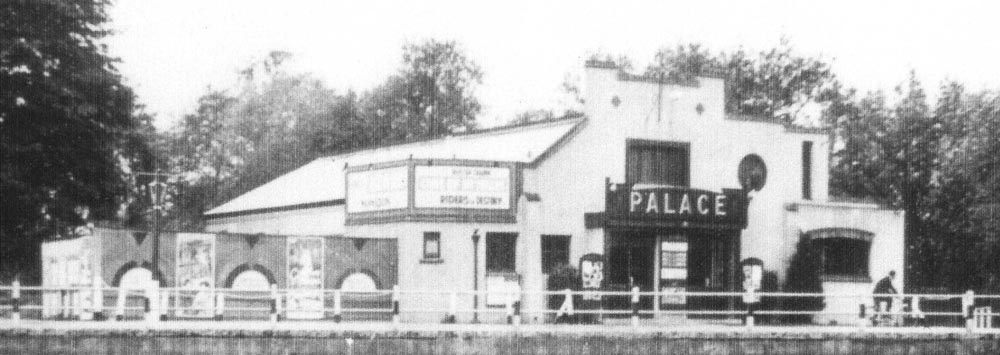 Dad didn't like going away so once Mum and I went to Margate for a week. Mum's sister and her young daughter came with us. We were excited for weeks about this. We had a horse cab to take us to the station. We had a mound of luggage because the dresses and petticoats were very long and full - not to mention the long white cotton drawers! We stayed with two old dears who were not related and we had what was called "bed and attendance". In other words we had two bedrooms and Mum or Auntie bought the food and the old dears cooked and served it for us. It was a big old Victorian house and smelt of stale cabbage and paraffin oil. There was a long beaded curtain in the hall and I don't know what use it was but I can remember the funny tinkling it made when you walked through it. Mum and Auntie would go for a walk and a drink in the evenings (this was unusual for two women to go into the pub without a man) whilst Mrs Marsh or Miss Marchbanks looked after my cousin and me. Mrs Marsh was a very ladylike person and always spoke very quietly. She was a retired school mistress and played the piano beautifully. One evening she played and sang "The Owl and the Pussycat" that was the first time I had heard it. Mum and Auntie were incensed when they got the bill - the old dear had added 6d "for use of the cruet". They paid it but we never went there again! Although Dad had three double passes a year and they could have travelled anywhere in the country they never went far. The furthest they ever went was for a week in Buxton. Towards the end of the first world war Mum had a married couple who lived in the rooms upstairs. It was compulsory to have all the bedrooms in use in those days. Mr Julian was a Canadian and was employed in the Ontario Hospital, now known as Orpington Hospital. She came from Buxton and after the war returned home. Mum and Dad had a holiday with them but I was too young to remember much about it. We were always well fed and clothed because Dad was always in work but I'm afraid that wasn't the case with many of the children that came to our school. I remember one little lad coming to school in a wheelbarrow as he hadn't any shoes but somebody must have given him a pair as he walked to school the next day. Our food was always wholesome and very plain. Dad wouldn’t touch anything fancy or with any kind of sauce on it. He wouldn't eat bought cakes, biscuits or pies neither would he touch pastes or bought jam. When he went to work he ate a lot of cheese sandwiches which he washed down with cold tea from a green glass bottle. The only chocolate I remember him eating was Fry's chocolate bars. We always had plenty of vegetables all the year round and it was quite normal to have four or five kinds every day. Dad grew them all on his allotment and I loved going over there with him - especially if he was taking the wheelbarrow because I always had a ride. In the summer I would help pick the strawberries and then Dad would wrap them in a rhubarb leaf to keep them fresh. He grew a lot of fruit as well - blackcurrants, redcurrants, gooseberries, strawberries and raspberries. Then Mum would be busy making jam (no freezers for surplus fruit). One year we had a linnet's nest in a gooseberry bush but we kept quiet about it as Dad was afraid some boys would take the young then rear and sell them. However they all flew away quite safely in time. Mum used to make lots of plum jam. She would buy them 7 lbs at the time (they were always very cheap) and make them into delicious jam which she stored in big stone galley pots. Most of it was used in rolly polly puddings and pastry. We always had a meat pudding on Saturdays. We had a joint of lamb, beef or pork on Sundays. Chicken were only served on special days - they were a treat. Often we had a chicken for Christmas. It is only in recent years that turkeys are eaten at Christmas. Mum would buy a turkey from Mr. Wood the fishmonger at the Corner of Chistlehurst Road. They would be hung outside the shop on the brick wall and they employed a night watchman to guard them. During the week, after the joint was finished, we had stews thick with vegetables and dumplings, meat pies (home made of course) liver and bacon or sometimes steak (which always seemed tough to me). Oranges were only obtainable around Christmas time and for about a month afterwards. When they first came they were always very sour so we would make a hole in the top and stick a lump of Sugar in them. Tangerines were much sweeter. During the Autumn I would go to the orchard at the bottom of Scads Hill with several other children. We always had a big black dog, Nigger, with us and Mum knew that if we had the dog with us we would be OK. The dog loved us all but I think he would have attacked anyone who touched us. I always took two baskets - one for eaters and one for cookers. It was an accepted thing that we could eat as many apples as we wanted on the way home. They were 2d and 3d a basketful. When the "keeping" apples were ripe Dad would go and buy a bigger lot (of course they were more expensive) and they were stored in an empty drawer and would last until well after Christmas (if they didn't get the "finger blight!"). We stored pears in the same way. I would often go down to the river and buy 6d worth of watercress. There used to be an old man who stood in the water in thigh boots and cut the cress. I would get a sizeable basketful and when I got home it was my job to pick out the weeds. I liked doing this because I could find all sorts of creepie crawlies or maybe, with a bit of luck, a tiddler (stickleback). In the spring the pond was full of frogspawn which turned into tadpoles and eventually little frogs. It was a great pity the Council built the solid wall around the Priory because the frogs couldn't get back into the pond to breed. If only they had had the foresight to leave a few holes in the bottom of the wall I'm sure there would have been more frogs around. We seldom see one here now but in the old days that alley was often referred to as "Frog Alley" especially when they came back in the spring. I started at Chistlehurst Road School when I was just turned three years old. I remember crying because I wanted to go to school with my brother. He was ten years older than me so he was quite able to take me and give me all the necessary details. They sat me next to the little girl who lived opposite so I soon settled down and loved every minute of my school life. We used to take a piece of cake or bread and butter for "elevenses" and the teacher would come round with an empty waste paper basket, write our names on the little packets and dish them out at play time otherwise I think they would have eaten them before time! One girl was very unpopular - she brought gorgonzola sandwiches with her! In those days they used to ring two bells for school time. The bell hung at the top of the school building (I wonder if it is still there?). If we knew it was "first bell" we would crawl along but "second bell" was a different matter and we ran as quickly as possible. We had good time keeping instilled in us by our fathers. I learned to tell the time as railwaymen do (i.e. 10:40), much to the amusement of my teacher and so I had to relearn time telling as "quarter to eight". The classrooms were small (although they appeared to me to be quite big) and we had an open fire with a big guard around it as well as some black hot water pipes. In the winter time the children who had come a distance would bring big scrubbed potatoes to bake in their jackets under the open fire. They had these at lunchtime. I have often thought what long distances some of them walked - some from Crofton, some near Orpington Hospital and one from Ramsden. Of course it was too far for them to go home for lunch and there was no school meals in those days. One family came from Cook's Poultry Farm (their father was the manager) and the farm was in Tubbenden Lane near the station. This was the farm where the famous Buff Orpington chickens were bred. There used to be quite a big sandpit near Poverest Recreation ground. We liked to go up there to play in the sand and there was a brook at the bottom of the field where we paddled. At the top of the sandpit were a few big holes almost like caves and I remember two boys digging in there when the sand collapsed on top of them. One boy managed to get out but the other little boy was dead from asphixia when they got him out. Several of the men then set too and filled in the caves to avoid another accident like that. There was also a gravel pit by the allotments. This, of course, was a great attraction to us kids. The only time we gave it a wide berth was when the red flag was flying as a warning that the men were practicing rifle shooting down there. The recreation ground was a big raspberry field when I was young. The woods beyond it were known as "Gloomy's woods (I don't know why) and we were never allowed up there unless accompanied by an adult. We heard all sorts of horrifying tales about those woods - mostly invented by stupid little boys to frighten the living daylights out of us. Another thing that has gone from Orpington is the glow worms. The bank by the side of the railway used to be covered in them on late summer evenings and we could always find strawberries there as well. Behind the White Hart pub was a big sportsfield. There used to be football played there on Saturdays during the winter (my husband remembered walking all the way from Bromley to watch the Bromley Boys team play Orpington and Bromley lost 4 - 1). There was an annual fair there with roundabouts, swings, seasaws and sideshows etc. We also had a sports day there. All kinds of racing for both adults and children and in the evening there would be climbing a greasy pole (I never saw anybody reach the top), pillow fights on a slippery pole and bowling for a live piglet - kept for a pet, eaten or sold? Yes, Orpington, was certainly a nice country village in which to live. Everyone seemed friendly and helpful and we knew most people who lived there. How it has altered! Now the fields and woods have been built on, the streams piped and the friendliness of the people has gone. Afraid its the march of so-called progress but I loved it as it was. |
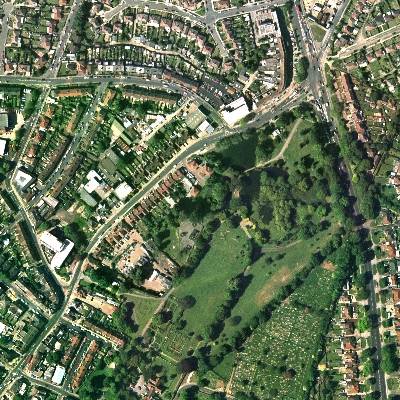 . .
. .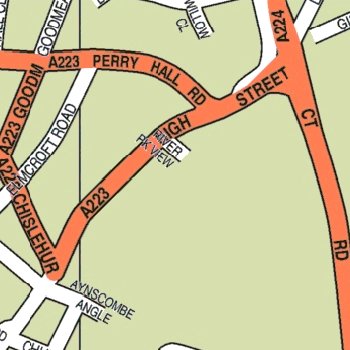
This is an aerial view of the area of Orpington in which my mother grew up. It shows the Priory Gardens with the High Street running diagonally across the map. Elmcroft Road, where she was born, is to the west of the High Street while Court Road is on the eastern edge. It is taken from buzzlondon.com.
![]()
Updated July 2005